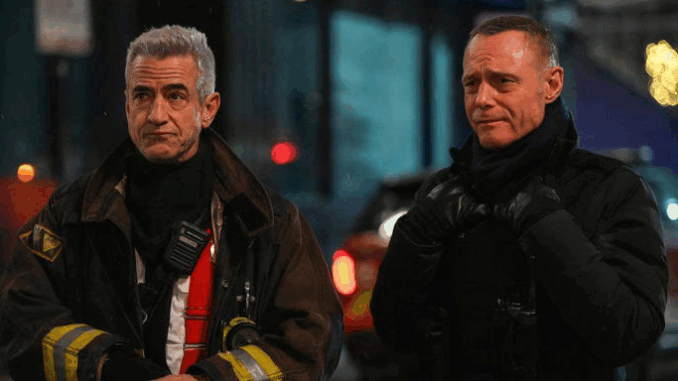
The One Chicago franchise—Chicago Fire, Chicago Med, and Chicago P.D.—is about to come back this fall stronger than ever, but not without sparking controversy. NBC’s recent confidential decision to enact strategic budget cuts and reduce main cast appearances has stirred a storm among fans and insiders. What’s driving this change? How will it affect the tight-knit Chicago universe? Let’s dive into why this move might redefine primetime drama.
What’s the Controversy All About?
Budget Cuts Hitting Hard
NBC is tightening the purse strings to trim production costs. Expect fewer episodes, reduced salaries, and more missing faces—especially from Chicago Fire
Cast Not in Every Episode
Some regulars won’t appear in every episode—editing costs, negotiating tax credits via Illinois residency, and reshuffling ensemble balance are all in play
What Exactly Is Changing?
Shorter Seasons Across the Board
Each One Chicago show is expected to air fewer episodes next season—a clear sign of the budget squeeze
Key Fire Members Step Down
Chicago Fire loses series regulars Daniel Kyri and Jake Lockett. Their departures reflect tough budget decisions .
No Raises, No Full-Year Contracts
Veteran actors will skip the usual 5% salary increase next season. Contracts won’t guarantee full-season appearances
Why This Decision Was Made
Ratings vs. Costs Reality Check
Despite strong viewership—46 million viewers across platforms —rising production expenses are straining finances. These cost cuts are NBC’s response.
Economic Headwinds in TV Production
Network dramas face tighter budgets post-pandemic and union strikes. Leveraging cost-saving tricks is essential to stay profitable .
Fanbase Reacts—Not All Smiles
Fan Outrage Over Cast Cuts
Longtime viewers are voicing disappointment as beloved characters vanish or take subsided roles. Social media buzzed with frustration.
Fear of Decline and “Cheap” Storytelling
Some fans worry production cuts will “water down” the franchise’s signature intensity—less action, fewer crossovers, simpler plots.
How the Franchise Plans to Cope
Focusing on Core Cast & Fresh Faces
Producers intend to spotlight central characters while introducing new story arcs with budget-friendly additions
Streamlined Storytelling Approach
Shorter seasons mean leaner, faster-moving storylines. Showrunners believe this will help maintain viewer engagement.
One Chicago’s Future—Still Bright?
Renewal is Still an Upside
All three shows are renewed—Fire for Season 14, P.D. for Season 13, Med for Season 11 That alone reassures fans.
Power of the One Chicago Night
Wednesday-night dominance remains strong, with franchise synergy bringing high ratings and crossover momentum
What This Means for You, the Viewer
Smaller Seasons, Bigger Punch
Expect bite-sized seasons packed with emotional arcs, compressed plotlines, and more action per minute.
More Emergent Characters
New agents, interns, and heroes may emerge organically through flashbacks, guest spots, or recurring roles.
Industry Insight—A Safe Bet or a Signal?
H3: A Smart Industry Play
Networks across the board are pivoting this way—spreading veteran cast appearances, negotiating filming incentives, and balancing budgets carefully.
Could This Backfire?
Yes—fans who feel the pacing or character focus suffer may drop off. One Chicago can’t afford to alienate devoted viewers.
Lessons One Chicago Can Teach Other Shows
Big Can Still Be Lean
Franchise success doesn’t demand bloated budgets. It demands good writing, tight ensemble direction, and invested fan storytelling
The Balance of Change
Writers must cleverly weave budget realities into compelling narratives—reducing cast doesn’t mean reducing emotional stakes.
Predictions for the Fall 2025 Seasons
-
Stronger Emotional Cores – fewer episodes, deeper character arcs.
-
Savvy New Patterns – rotating guest stars, more medical/police hybrid cases.
-
Lean Crossovers – tight three-show events with max fan service and minimal costs.
-
Strategic Exits or Returns – with budgets tight, exits may be written smartly; returning favorites possible in special episodes.
Conclusion
While NBC’s decision to cut costs and reduce cast presence across the One Chicago franchise is controversial, it also shows commitment to the franchise’s long-term survival. Streaming data and audience loyalty remain strong—but so do production challenges. Success next season will depend on creative adaptability: delivering heart, action, and drama—even on a leaner budget. One Chicago isn’t going away, but it may soon be doing more with less—and could redefine what success means on network TV.
FAQs
Q1: Are any One Chicago shows cancelled?
A1: Nope. Chicago Fire (S14), Chicago P.D. (S13), and Chicago Med (S11) all got renewed despite budget cuts .
Q2: Which cast members are affected by the cuts?
A2: On Chicago Fire, Daniel Kyri and Jake Lockett will lose series regular status. Other veteran actors across the franchise will skip raises and may miss episodes .
Q3: Will this change the number of crossover events?
A3: Probably fewer, but more targeted, high-impact crossovers. Networks need to maximize return on costly events .
Q4: Will story quality suffer?
A4: That’s the fear. But showrunners promise tighter scripts, deeper character arcs, and a renewed focus on core cast dynamics.
Q5: Can fans expect surprise returns or cameos?
A5: Yes. With flexible cast arrangements, guest appearances might spike—especially during big episodes or new character introductions.
